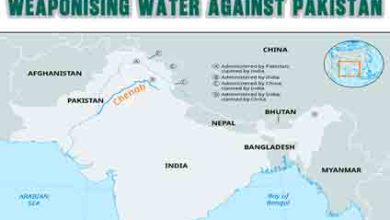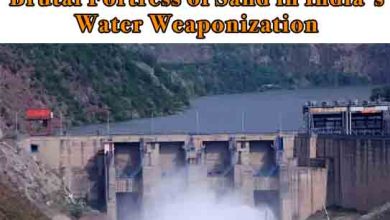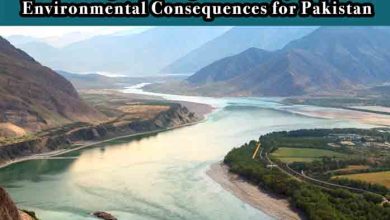Dangerous Waters: Emergent Indus Water Sharing Challenges Threaten Regional Stability
Emergent Indus water sharing challenges between India and Pakistan are escalating due to climate change, growing demand, and geopolitical tensions. Learn how both countries are navigating the crisis.
The Emergent Indus Water Sharing Challenges are fast becoming a flashpoint in South Asian geopolitics. At the heart of this water dispute lies the Indus Waters Treaty (IWT), a 1960 agreement brokered by the World Bank between India and Pakistan. While often heralded as a rare diplomatic success, the treaty is showing its age in the face of climate change, population explosion, and increased energy demands.
Originally crafted to allocate the six rivers of the Indus Basin—three eastern rivers to India (Ravi, Beas, Sutlej) and three western rivers to Pakistan (Indus, Jhelum, Chenab)—the IWT was designed as a water distribution mechanism rather than a collaborative water sharing strategy.
Why the Treaty Is Under Pressure Today
The Emergent Indus Water Sharing Challenges stem from multiple sources:
-
Rapid urbanization and population growth in both countries.
-
Depleting water tables and deteriorating glacial supplies.
-
Increasing hydropower projects by India on the western rivers.
-
Growing climate-induced unpredictability in river flows.
Today, the treaty is strained not only because of ecological shifts but also due to India’s intent to renegotiate or bypass it. Last year, India sent formal notice to Pakistan seeking modifications. The immediate context was the Pahalgam attacks in occupied Kashmir, which India used to suspend the treaty’s consultative processes.
India’s Shifting Water Strategy
India, as the upper riparian state, holds geographical advantage. However, under the IWT, it cannot divert or store significant volumes from the western rivers. Frustrated by recurrent border conflicts, India has threatened to weaponize water, considering new dam-building projects on the Chenab and Jhelum rivers.
Although existing Indian hydropower infrastructure operates on a run-of-the-river basis with minimal storage, new large-scale projects could change the game. Such projects would allow India to control timing and volumes of water flow, especially during Pakistan’s critical dry season (October to March).
That said, major dam construction faces:
-
Geological instability in Himalayan zones,
-
High economic costs,
-
And potential for backlash from downstream flooding in Indian-administered territories.
Pakistan’s Alarming Dependence on Western Rivers
Pakistan relies on the western rivers for nearly 80% of its irrigation and domestic water needs. With no alternative sources of freshwater, any Indian manipulation of water flows presents a dire existential threat.
In response, Pakistan is:
-
Accelerating construction of the Mohmand Dam and Diamer-Bhasha Dam,
-
Seeking support through international forums like the Permanent Court of Arbitration (PCA),
-
And warning that any unilateral Indian storage project would be interpreted as an act of war.
However, analysts believe that even with new reservoirs, Pakistan lacks capacity to withstand more than short-term flow disruptions. The shrinking Indus Delta is another warning sign, as reduced freshwater outflows already threaten coastal livelihoods and ecosystems.
Legal Arbitration and Global Repercussions
In July, the Permanent Court of Arbitration (PCA) at The Hague clarified that India cannot unilaterally withdraw from the IWT. It also confirmed that the PCA has jurisdiction to adjudicate disputes under the treaty.
While Pakistan welcomed the ruling, India rejected the PCA’s authority, asserting it would not comply. This stance could have ripple effects:
-
It weakens India’s diplomatic standing on other transboundary rivers like the Brahmaputra.
-
It encourages China, India’s upstream neighbor, to similarly ignore downstream Indian interests.
-
It undermines international law and precedent, making water disputes more combustible worldwide.
The Need for an Updated Water Agreement
Experts argue that instead of escalating hostilities, both nations must revisit the IWT with a focus on:
-
Environmental flows to restore the Indus Delta,
-
Joint water conservation and data sharing,
-
Climate change adaptation strategies,
-
And mechanisms for early warning systems and dispute resolution.
Rather than seek more water from the eastern rivers, Pakistan may gain more international credibility by pushing for treaty upgrades that enhance human security and environmental cooperation.
Moreover, global institutions and climate funds may be more inclined to support shared conservation projects, if both countries show willingness to modernize the treaty.
Conclusion: Pathways to Sustainable Peace
The Emergent Indus Water Sharing Challenges are no longer just about treaty violations or infrastructure. They are about human survival, regional peace, and climate justice.
As South Asia faces rising water stress, cooperative water diplomacy is the only viable path forward. By shifting focus from zero-sum control to mutual benefit, India and Pakistan can transform a crisis into an opportunity for sustainable peace.
“Water is not a weapon—it is a shared necessity. And in the age of climate uncertainty, treaties must evolve or perish.”
Internal Link Suggestion:
External Link Suggestions:







